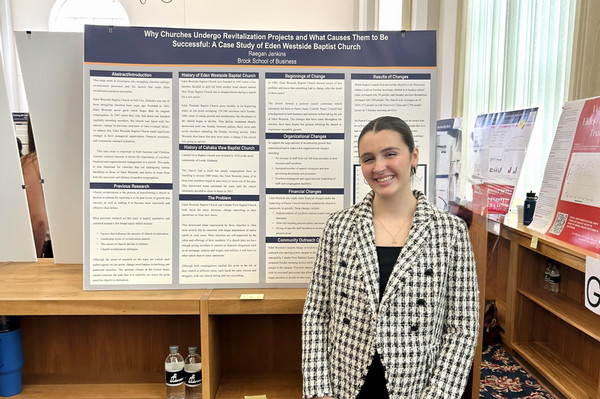 Samford University’s Brock School of Business was well represented at the fourth annual Student Research Colloquia on Friday, April 25. The Research Advisory Collaborative, in partnership with the Office of Research, hosted the public forum where both undergraduate and graduate Samford students presented their scholarship and research. Senior Brock Scholar Raegan Jenkins, a senior accounting, nonprofit management and social entrepreneurship student, was one of the winners in the undergraduate research category.
Samford University’s Brock School of Business was well represented at the fourth annual Student Research Colloquia on Friday, April 25. The Research Advisory Collaborative, in partnership with the Office of Research, hosted the public forum where both undergraduate and graduate Samford students presented their scholarship and research. Senior Brock Scholar Raegan Jenkins, a senior accounting, nonprofit management and social entrepreneurship student, was one of the winners in the undergraduate research category.
Jenkins’ research centered around a case study of Eden Westside Baptist Church in Pell City, Alabama, that explored the factors that contributed to successful church revitalization. Once a small congregation facing decline, Eden Westside underwent major organizational and financial reforms beginning in 1987. At the time of the study, it operated across two campuses and served thousands each week. Jenkins’ research highlighted the role of strategic leadership, budgetary restructuring and mission alignment in fostering long-term growth. Her work bridged business principles and ministry practice, offering a valuable model for churches experiencing similar challenges.
Jenkins said combining her interests made the project especially meaningful. “The most rewarding aspect of my research was being able to combine two subjects that I am passionate about, business and ministry,” she said. “I loved getting to study the ways that the business processes of a church enable the church to fulfill its core missions.”
Through interviews and firsthand analysis of Eden Westside’s transformation—from a struggling congregation to a thriving church with five services and two campuses—Jenkins showed how leadership, budgeting and organizational strategy were essential not just in the corporate world but in churches striving to remain vital to their communities. She credited her academic foundation at Samford as a key factor in shaping her research. “The most helpful part of the Samford curriculum in regard to this project was my Oxbridge tutorial with Dr. Steve Jones,” she said. “It was in this class that I truly discovered the intersection of my passions and the importance of both in a successful ministry.”
Steve Jones, chair of the Department of Economics, Finance and Quantitative Analysis, served as Jenkins’ faculty mentor. “Raegan started her senior year with several ideas regarding what she might want to do for her Brock Scholars thesis and then spent a good bit of time during fall semester exploring what options would and would not work,” he said. “She wanted to make sure that she had both an interesting topic and a feasible work plan. That up-front investment of time and effort paid huge dividends for her in performing the actual work of the thesis itself.”
Also representing Brock School of Business at the colloquia were fellow Brock Scholars, Will Miller and Sloane Womac.
Miller, mentored by Stephen Hill, associate professor of data analytics, investigated the financial vulnerability of professional athletes, many of whom faced bankruptcy shortly after retirement despite earning substantial incomes during their careers. By analyzing data from 150 athletes through a logistic regression model, Miller identified key factors that could predict financial instability. His findings offered timely insight as collegiate athletes increasingly engaged in NIL (name, image and likeness) partnerships. The study underscored the critical need for financial education and proactive planning in both professional and collegiate athletic settings.
Womac, mentored by Kate McCombs, assistant professor of management, conducted an interdisciplinary study examining how individuals cultivated faith and adaptability in the midst of crisis. Drawing from three sources—survivor narratives from the 1994 Rwandan Genocide, qualitative data from students at the Isomo Academy in Rwanda and biblical accounts of crisis response—Womac developed a conceptual model that explored the cyclical relationship between faith, self-leadership and personal growth. Her research contributed to ongoing discussions at the intersection of faith, leadership development and resilience in high-stress contexts.
Each of these student projects exemplified Brock School of Business’ commitment to cross-disciplinary exploration and calling-driven education. Whether exploring faith amid crisis, analyzing athletic finance or uncovering what made a ministry thrive, these students lead with purpose, in the classroom and beyond. This hands-on approach is part of what led The Wall Street Journal to rank Samford No. 8 nationally for career preparation, recognizing the university’s strong focus on equipping students for life after graduation.

